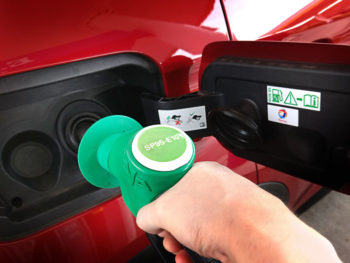E10 could address air pollution and fuel duty concerns in short term, APPG report finds
Introducing E10 higher-concentration bioethanol to the UK could help cut CO2 emissions in the short term without the need for widespread EV roll-out and without impacting fuel duty.
That’s the finding of a new Interim Report from the APPG for British Bioethanol as the Government explores the potential launch of the fuel in the UK.
Already available in Europe, the E10 fuel – which usually carries ‘green’ branding – features 10% bioethanol content compared to 5% in standard unleaded petrol in the UK, and is said to offer a 2% improvement in CO2 emissions. As such, it’s been greeted for its ability to meet transport carbon targets and support the economy, according to organisations including the LowCVP in its report.
With the Department of Transport expected to make an announcement later this year on the introduction of E10, following a consultation and changes to the Renewable Transport Fuels Obligation (RTFO) as well as its rollout of new fuel labels, the Interim Report from the APPG for British Bioethanol has been published in response to a call for Written Evidence and two Oral Evidence sessions hosted in the Palace of Westminster.
The report sets out a number of findings, including that E10 could assist in addressing the UK’s serious air quality problems in the short term. It adds that the deployment of E10 would save the equivalent emissions of taking up to 700,000 cars off the road and says that achieving the same GHG emission reduction through electric vehicles would have a very significant cost, including a one-off grant charge of £2.45bn to the Government and recurring annual cost of £350m to replace the lost fuel duty revenue; equating to £2.8bn. This would be in additional to the investment required to ensure the Grid could supply sufficient green electricity and other infrastructure investments including charging points.
The report also says that without E10 it is more likely that the UK will miss its fuels quality directive target; although the “buy out” cost avoidance even with E10 is estimated at £100m, it could be more than double this without E10 – and these costs are likely to be passed on to motorists in fuel prices at the forecourt. In fact, a fuel blend of approximately 25%, E25 or above, would be required to meet the Government’s GHG targets.
The possible introduction of E10 would also come at an opportune time in terms of rising petrol car sales; latest SMMT figures show new car petrol registrations rose 3.6% for the first five months of 2019 while diesel registrations were down 18.4%. And the market is also seeing a trend towards less fuel-efficient petrol cars such as SUVs.
Chair of the APPG, Nic Dakin MP said: “Our Inquiry has heard there are in fact increasing numbers of petrol cars on UK roads, and these cars are getting bigger and increasingly less fuel efficient on average. With mass adoption of pure electric cars decades away and the decreasing popularity of diesel, increasing volumes of petrol are being sold.
“With an urgent need to address the causes of climate change, improve air quality and support job creation in emerging green industries, practical measures which make petrol cars cleaner and greener must be a top priority for the Government who must now work to mandate the introduction of E10 in the UK by 2020 at the latest.”
However, the potential introduction of E10 in the UK has also caused some controversy over the last year, including over the number of cars that won’t be compatible with the fuel; according to the LowCVP report, 8% of petrol cars can’t use the fuel.
And although such compatibility issues with older vehicles are not expected to affect fleets, the increased usage of bioethanol in E10 and its impact on fuel efficiency, particularly for cars with smaller engines, could present problems, bringing higher fuel bills for drivers and fleets.
RAC Business has also previously warned of other issues, including that where the fuel has been rolled out in Europe, “it hasn’t been well received in all quarters, with some drivers actively boycotting it due to potential damage to their vehicles”.













